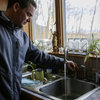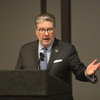County officials: Getting to Phase 2 is up to you
ALBANY COUNTY — One day into the first phase of reopening for the Capital Region, the county’s executive, Daniel McCoy, had advice for businesses and the county’s health commissioner, Elizabeth Whalen, had advice for residents.
Both have the goal of getting to Phase 2 on July 1 without a spike in COVID-19 cases.
“It’s going to take all of us working together to make sure we stay open,” McCoy said at his Thursday morning press briefing.
McCoy displayed a form, available on the New York Forward website that each reopening business must fill out with its plans for keeping workers and customers safe. The plan is to be kept on the business’s premises.
Essential businesses that have been running throughout the shutdown have to fill out plans as well.
A second form, with material specific to each type of business, has to be signed and submitted back to the state. McCoy said the agreement commits business owners to staying up to date on ever-changing county, regional, and state directives.
“It not only educates you; it protects you,” said McCoy.
McCoy urged business to keep a log of customers who visit to make it easier for the health department to trace those people if there is a confirmed case at the business.
He said of consumers, “You’re the front line of defense.” McCoy said patrons should contact the health department if they see violations. “We can’t be everywhere,” he said.
McCoy acknowledged that it is not yet clear what the enforcement policies will be and which police agencies will be called upon. He also said he was trying to get answers on summer camps and day care programs since people returning to work are looking for answers.
Currently, he noted, people can’t be in groups of more than 10.
Governor Andrew Cuomo, in his press briefing on Thursday, said that summer school will be conducted online to reduce the risk of spreading the virus. Meal programs and child-care services for essential employees will continue, Cuomo said.
School districts must also develop a plan for students with disabilities who participate in extended summer school year programs over the summer to ensure they receive instruction. The state will make a determination about the fall semester and issue guidelines in June. Schools and colleges will submit plans for approval to the state in July.
Cuomo said on Thursday that the state is currently investigating 157 reported cases in New York where children — mostly school-aged — are experiencing symptoms similar to an atypical Kawasaki disease and toxic shock-like syndrome possibly due to COVID-19. So far, 13 countries and 25 other states have reported cases of this COVID-related illness in children.
McCoy said on Thursday that another Albany County resident — a man in his seventies who had lived in Shaker Place, the county’s nursing home — died of COVID-19, bringing the county’s death toll to 73. He is the 15th resident of Shaker Place who has died of the disease.
So far,1,578 county residents have tested positive for COVID-19 with 906 under mandatory quarantine and five under precautionary quarantine. The five-day average of daily new positive cases is now at 25.4. As of Thursday morning, 3,993 county residents have completed quarantine, with 1,043 of them having tested positive and recovered.
Twenty-five residents are hospitalized, with one in an intensive-care unit. The hospitalization rate for Albany County stands at 1.58 percent.
Mitigation
Whalen addressed the public directly, saying that “to stay on the right track” and not cause businesses, once opened, to close, “the responsibility is in your hands.” She said the same mitigations strategies that she has highlighted since early March are essential in tandem with diagnostic testing for COVID-19.
Workers at businesses that are now opening — manufacturing, constructions, retail with curbside pickup, and farming and fishing — are to be tested.
Describing testing as a “cornerstone,” Whalen said it is important because “asymptomatic spread is a real thing.” People who have COVID-19 may not know it and unwittingly spread it. But, if they test positive, they can be isolated for two weeks, and prevent the spread.
Community mitigation must continue as well, said Whalen, stressing the need for frequent handwashing, keeping six feet from others, and wearing masks when this is not possible.
Wearing masks, she said, “can decrease up to 70 percent of the spread; this is significant and it is serious.”
Surgical masks, she reiterated, “are not foolproof for the wearer.” Rather, they prevent the wearer from spreading the disease.
Whalen demonstrated how a mask must be worn, covering both her nose and mouth. “If you have your nose out of the mask,” she said, “you are not protecting anyone else and you are contaminating your mask.”
Whalen said she has also seen many people taking a break from mask-wearing by pushing their masks down around their necks. “Masks are off or on — no in between,” she said.
If they are off, they can be held by the ear elastics so as not to contaminate the mask itself.
Whalen concluded, “What you do now is going to influence what happens in two weeks. What do we want to happen in two weeks? We want to get to the next phase. It is dependent on all of us to play our part, do the responsible thing.”


